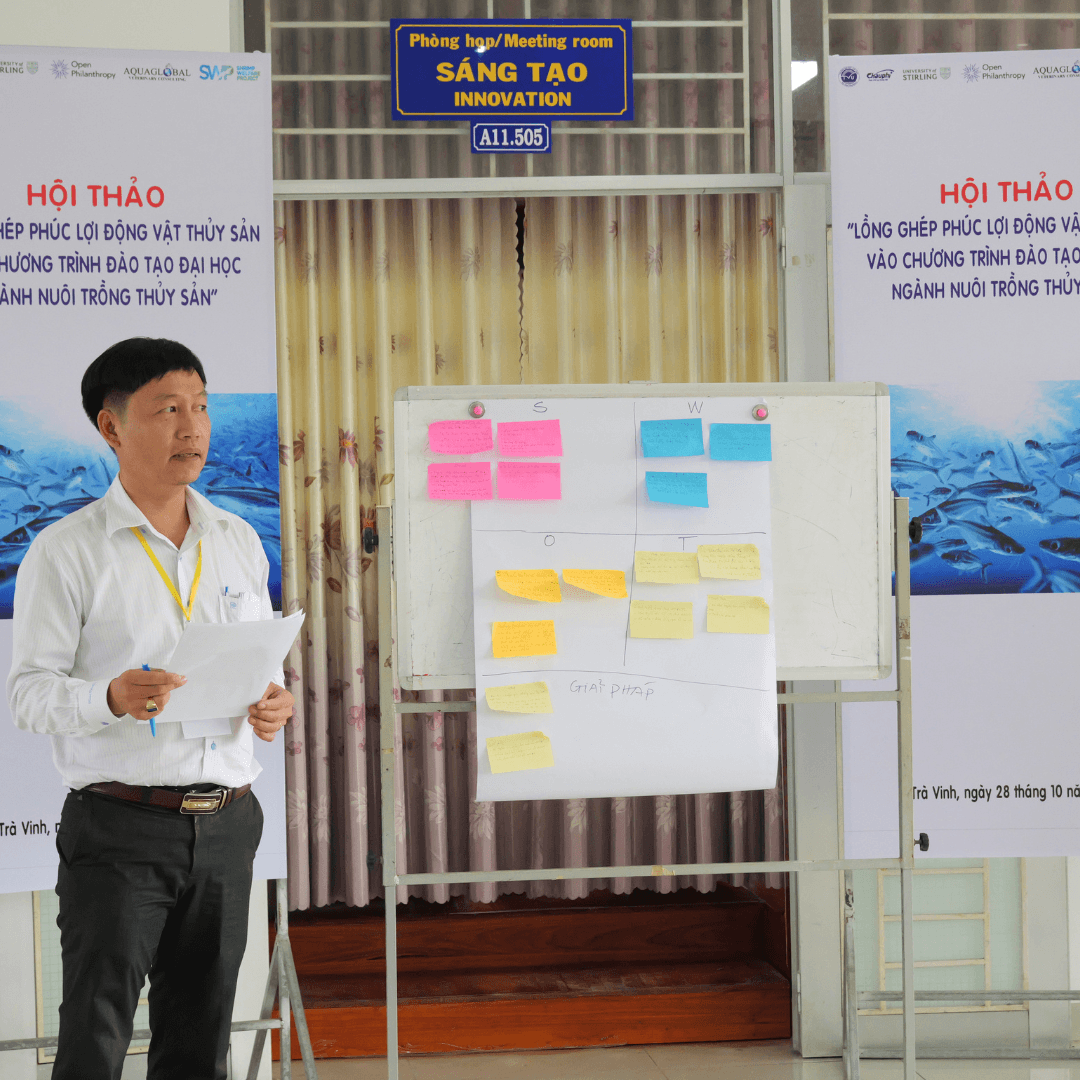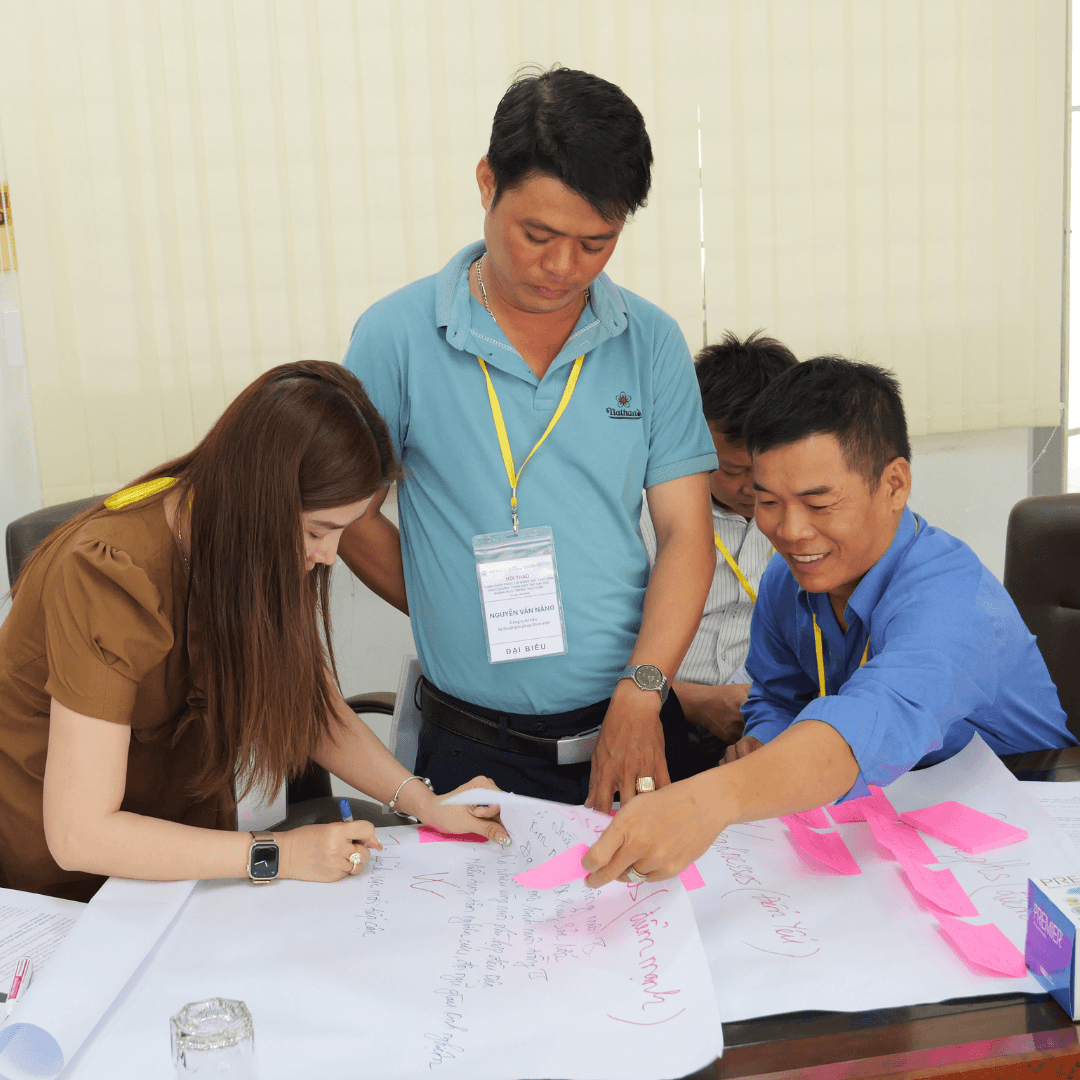SWOT Analysis: strengthening aquatic animal welfare education in Vietnam
Closing the education gap: building aquatic animal welfare into Vietnam’s education system
In Vietnam, aquaculture is both a cornerstone of food production and a vital source of livelihoods, being the fourth largest aquaculture producer globally. As the sector grows, global markets and scientific evidence increasingly point to the importance of aquatic animal welfare (AAW), not only as an ethical responsibility, but also as a driver for animal health, environmental sustainability, and product quality. Yet AAW remains underdeveloped in Vietnam’s education system.
To tackle gaps in aquatic animal welfare education, Tra Vinh University (TVU) teamed up with Chauphi Fisheries (Vietnam), Shrimp Welfare Project (UK), and Aquaglobal Veterinary Consulting (South Africa). Within the University of Stirling’s wider “Improving Farmed Fish Welfare in Asia” project, funded by Open Philanthropy, our team led a workshop in October 2024 that focused on addressing the aquatic animal welfare education gap in Vietnam’s undergraduate tertiary institutions. Here a SWOT analysis was undertaken, to examine the integration of a more comprehensive aquatic animal welfare education strategy tailored to the Vietnamese context.
Bringing stakeholders together
The workshop assembled a broad and representative mix of voices to ensure the proposed strategy would be practical, context-sensitive, and forward-looking. Academics and researchers from five universities — Can Tho University (CTU), Dong Thap Community College (DTCC), Bac Lieu University (BLU), Soc Trang Vocational College (STVC), and Tien Giang University — joined TVU academics to provide the scientific and educational backbone to the discussion.
Sixteen industry stakeholders attended, representing major companies and local enterprises such as FAI Farms, Minh Phu Seafood, Rynan Smart Aquaculture, Bioblue Vietnam, and Vicom, bringing real-world operational perspectives and business considerations. Students and alumni contributed the fresh insights and on-the-ground curiosity of the next generation, while guest speakers from organisations including RIA2, CTU, DTPP, and the Shrimp Welfare Project added regional expertise and comparative experience.
This mix of academia, industry, government-linked researchers and young professionals ensured the strategy development process considered both theory and practice.
Identifying strengths, weaknesses, opportunities, and threats
Participants engaged in a structured SWOT analysis to map the current landscape for AAW education in Vietnam.
Strengths surfaced clearly: the Vietnamese government’s expressed interest in policy development related to aquaculture, existing AAW awareness among academic staff, strong disciplinary expertise in behaviour and species biology, and robust university–industry collaboration that creates pathways for experiential learning. Students’ enthusiasm for AAW and TVU’s accredited aquaculture training program were also identified as critical foundations to build upon.
At the same time, weaknesses were evident: AAW remains relatively novel to many industry professionals, translated Vietnamese resources are sparse, there is no established model programme in-country, and cost concerns and limited training infrastructure reduce the pace of adoption.
Participants also recognised powerful opportunities: integrating AAW education could enhance the international competitiveness of Vietnamese seafood, enrich curricula and research pathways, attract donor funding, and enable graduates to offer value-added skills to industry.
Finally, the group acknowledged real threats: the cost of welfare-compliant practices could affect competitiveness, funding for specialised training is limited, regulatory frameworks do not yet prioritise AAW, and climate change and entrenched technical practices pose practical challenges to implementation.
Recommendations for moving forward
From the workshop discussions emerged a pragmatic set of recommendations designed to translate insight into action. Participants recommended forming a professional working group to guide integration efforts and to develop standard operating procedures aligned with tertiary-sector regulations.
Creating Vietnamese-language resources, from translated documents and handbooks to seminars and media materials, was prioritised to broaden accessibility.
Curriculum-focused strategy included drafting AAW content for theoretical and practical subjects and exploring the possibility of a dedicated credited subject, while leveraging TVU’s two-year programme review cycle to embed changes sustainably.
Capacity building for faculty, government staff and industry trainers was identified as essential, alongside pilot teaching sessions for second- and third-year students to test content and assessment frameworks.
Strengthening industry partnerships through MoUs, allocating research funding toward AAW projects involving students, and developing a common evaluation framework based on the Five Freedoms of Animal Welfare, were all recommended as ways to ensure alignment between education, research and practice.


The bigger picture
Integrating aquatic animal welfare into Vietnam’s education system is more than an academic exercise: it is a strategic investment in the country’s aquaculture future.
Improved welfare practices lead to healthier animals, reduced disease burden and potentially lower environmental impacts, which in turn can increase product quality and marketability. Educated graduates who understand welfare science and its practical application will be better equipped to drive change on farms, in processing facilities and in policy forums.
For Vietnam, being a major global aquaculture producer, this alignment with international welfare trends can strengthen competitiveness, open access to premium markets, and position the country as a regional leader in sustainable aquaculture.
At Aquaglobal Veterinary Consulting Pty. Ltd., we believe that linking education, industry and research is the fastest route to meaningful improvement in farmed fish welfare. This workshop marks an important step toward strengthening aquatic animal welfare capacity and industry collaboration across Vietnam. This initiative lays the groundwork for long-term change that benefits animals, producers and consumers alike.
If you’re an educator, researcher, or industry professional interested in advancing aquatic animal welfare, we invite you to connect and explore opportunities to collaborate.



